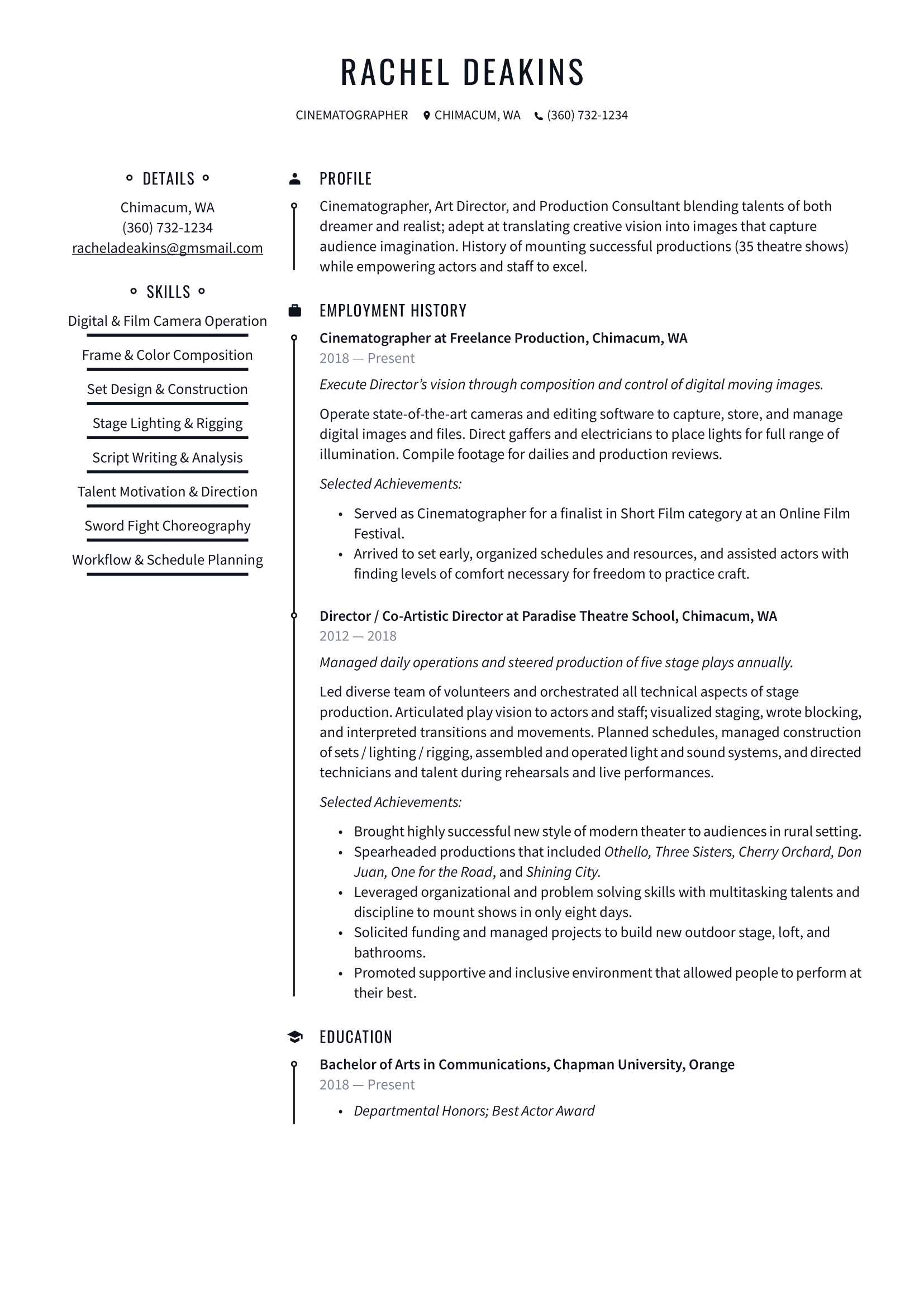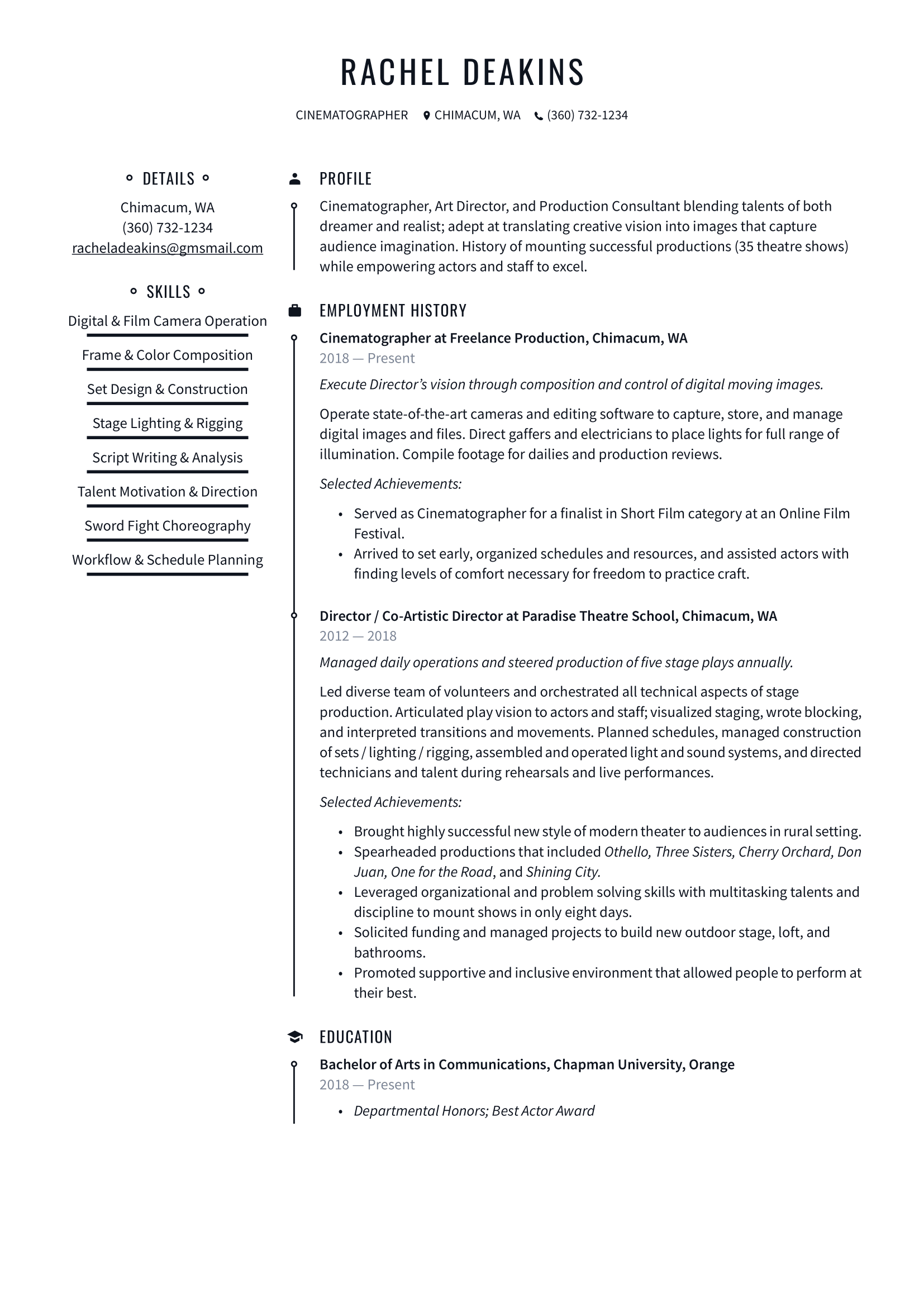Cinematographer Resume Example & Writing Guide
- Why use this cinematographer resume example?
- How to write a great cinematography resume
- Which key skills are relevant for a cinematography resume?
- Cinematographer resume example
Cinematographers are key contributors in film production, and they determine the visual style for movies, television shows, videos, and advertising. They're responsible for ensuring the director's vision is accurately portrayed on screen, while also taking care of technical tasks for creating the visual story. To create an award-winning cinematographer resume, you need to showcase your skills and expertise so that you stand out in this competitive field.
Why use this cinematographer resume example?
Your resume needs to start with a great intro that summarizes past and present roles, strong experience, and outstanding cinematography skills. Just like in a movie, your introduction or preview has to be strong, yet not so long that it bores your audience with too many details. Save the details for the main event, which is your professional experience section.
Consider writing your intro or summary last. Once you have crafted the other sections of your resume, you will be able to see the big picture and create an introduction that succinctly encapsulates your story.
The areas of emphasis section is where you list your key skills. Use keywords and industry terms. About eight to ten keywords is a good limit.
The last act in this great cinematographer resume covers technology. Include all of your relevant software and hardware expertise, but don’t make it too lengthy. Target the role you are going for by listing skills that are directly related to it.
How to write a great cinematography resume
As a cinematographer, you know the impact of having the best visual style. Using the right format for your resume is like framing the perfect shot. Our example will help you organize your resume so that it’s easy to read and includes the most important information from your current and past roles.
A reverse-chronological resume format is the overwhelming winner in this category. It puts your leading roles up front and keeps the older history in the background. It is best practice to keep your work history focused on the last 10 to 15 years. It is acceptable to omit experience that is very old or irrelevant to the role you are pursuing.
Put a spotlight on your education. George Lucas and Martin Scorsese may tell you that you don’t need a degree to be a great cinematographer, but it doesn’t hurt. So, if you’ve got it, flaunt it. Create a separate section on your resume for education and applicable training. List any college degrees you have, along with relevant job training and memberships with industry-related associations. If any of this information is more than 10 years old, including dates is optional.
Which key skills are relevant for a cinematography resume?
To be a great cinematographer, you must have some mad creative skills. To get that next starring role, your resume has to showcase those skills, and they have to fit the part you are auditioning for with employers.
The list below includes some awesome hard and soft skills for a cinematographer:
Adobe Premiere Pro
Art direction
Attention to detail
Camera manipulation
Collaboration
Communication
Lighting techniques
Production management
Video editing
Project management
Set design
Cinematographer resume example
Summary example
Cinematographer, Art Director, and Production Consultant blending talents of both dreamer and realist; adept at translating creative vision into images that capture audience imagination. History of mounting successful productions (35 theatre shows) while empowering actors and staff to excel.
Employment history example
Cinematographer as Freelance Production in Chimacum, WA
2018 - Present
Execute Director’s vision through composition and control of digital moving images.
Operate state-of-the-art cameras and editing software to capture, store, and manage digital images and files. Direct gaffers and electricians to place lights for full range of illumination. Compile footage for dailies and production reviews.
Selected Achievements:
Served as Cinematographer for a finalist in Short Film category at an Online Film Festival.
Arrived to set early, organized schedules and resources, and assisted actors with finding levels of comfort necessary for freedom to practice craft.
Director / Co-Artistic Director at Paradise Theatre School, Chimacum, WA
2012 - 2018
Managed daily operations and steered production of five stage plays annually.
Led diverse team of volunteers and orchestrated all technical aspects of stage production. Articulated play vision to actors and staff; visualized staging, wrote blocking, and interpreted transitions and movements. Planned schedules, managed construction of sets / lighting / rigging, assembled and operated light and sound systems, and directed technicians and talent during rehearsals and live performances.
Selected Achievements:
Brought highly successful new style of modern theater to audiences in rural setting.
Spearheaded productions that included Othello, Three Sisters, Cherry Orchard, Don Juan, One for the Road, and Shining City.
Leveraged organizational and problem solving skills with multitasking talents and discipline to mount shows in only eight days.
Solicited funding and managed projects to build new outdoor stage, loft, and bathrooms.
Promoted supportive and inclusive environment that allowed people to perform at their best.
Education example
Bachelor of Arts in Communications at Chapman University
Skills example
Digital & Film Camera Operation
Frame & Color Composition
Set Design & Construction
Stage Lighting & Rigging
Script Writing & Analysis
Talent Motivation & Direction
Sword Fight Choreography
Workflow & Schedule Planning


